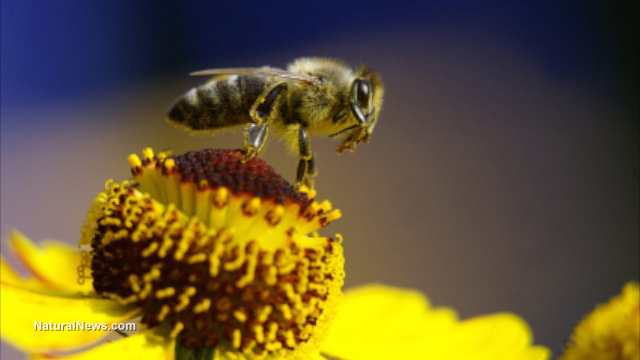South Carolina sprays for Zika, further decimates honeybee population
Sunday, September 04, 2016 by: Vicki Batts
Tags: honeybees, pesticides, Zika

(NaturalNews) Honeybee deaths have spread across Dorchester County, South Carolina, with millions of worker bees collapsing in little groups by their hives' entrances. However, this pattern of death does not suggest colony collapse disorder; most of the bees were trying to get to their hives, probably for safety. Rather, the evidence indicates that these poor little bees were the victims of acute pesticide poisoning.
This heartbreaking news is not terribly surprising; the tidal wave of bee deaths follows a local government decision to spray a number of areas across the country with Naled, a type of pesticide that's being used in the name of Zika prevention. On Sunday, August 28, Dorchester County sprayed the hazardous insecticide across the region.
Flowertown Bee Farm and Supply, an apiary located in Summerville, has reported that 46 of their hives died on the day of the spraying; that equates to about 2.5 million bees. A scientist from Clemson University collected soil samples from Flowertown to investigate the cause of the bee deaths, but to bee farmers the reason is already quite clear: The bees were poisoned and killed by pesticides. Naled, their poison of choice, is known to be very toxic to bees, as well as mosquitoes.
Even though no one in the country has been infected by a locally-acquired Zika infection, officials have taken it upon themselves to go ahead and spray the area anyway. Normally, the country utilizes trucks to promote ground-based mosquito control efforts. For whatever reason, on Sunday they decided to try something new and sprayed across their skies for the first time. The county says it posted plenty of warnings about the pesticide mist set to rain down on citizens. They put out one notice in the newspapers on the Friday before, and one Facebook post on Saturday. Unfortunately, it appears that bees can't read and didn't know they were supposed to stay home that morning.
Local beekeepers do not feel that they were given any advance notice about the spraying. Honestly, if you use social media at all, you know that you don't always see every single story an organization posts in your news feed, and not everyone buys a newspaper seven days a week.
Even county administrator Jason Ward has admitted that the county did not follow the usual procedures before engaging in the mass spraying (and subsequent killing of bees). Ward told The Post and Courier, "We usually call registered beekeepers prior to spraying in their zone." The county official also conceded that they had, for some unacknowledged reason, skipped that step this time.
Juanita Stanley of Flowertown Bee Farm and Supply said, "My bee yard looks like it's been nuked." Stanley is absolutely heartbroken, not over the loss of income, but because she feels that her bee yard is supposed to be a sanctuary for her bees, where they can be safe and protected. County mistakes have led to the death of millions of bees, just in that one apiary.
While the county has acknowledged the bee deaths and expressed their displeasure, no real apology has been issued. Instead, the county maintains that the spraying was done to protect people from mosquitoes. However, the CDC itself has stated that adulticide (killing of adult insects) is the least efficient way to control the mosquito population, regardless of whether spraying takes place on the ground or in the air.
Naled is an organophosphate that is regarded as "safe" by the EPA because it "dissipates so quickly it is not a hazard to people," as per the Washington Post. However, the agency does note that exposure to humans is not advised. Naled exposure is linked to a variety of cancers and other adverse effects, such as impaired brain development in unborn children. One of Naled's breakdown products is dichlorvos, which is another type of organophosphate that is also toxic. In studies, exposure to dichlorvos has been linked to a number of ill effects, including increased aggression, impaired memory and impaired prenatal brain development.
Naled, like just about every other pesticide on the market, clearly harms way more than the intended target. Perhaps we should stop spraying pesticides and look for more natural means of protection.
Sources:
WashingtonPost.com
PostAndCourier.com
NoSpray.org
Honeybees at FETCH.news
Get independent news alerts on natural cures, food lab tests, cannabis medicine, science, robotics, drones, privacy and more.
Take Action: Support Natural News by linking to this article from your website
Permalink to this article:
Embed article link: (copy HTML code below):
Reprinting this article:
Non-commercial use OK, cite NaturalNews.com with clickable link.
Follow Natural News on Facebook, Twitter, Google Plus, and Pinterest
- Newly released JFK files reveal Pentagon's role in creating Lyme disease and covid in the same lab
- Oncologist warns of ‘terrifyingly aggressive’ cancers in children, linked to immune suppression from COVID vaccines
- Trump administration CUTS FUNDING to Gavi, the Vaccine Alliance - a major blow to the Bill Gates-backed entity
- Health Ranger Report: Ashton Forbes discusses TELEPORTATION ORBS and their role in MH370 disappearance
- NIH study, buried for decades, reveals that Flu Shots INCREASE elderly deaths, not prevent them
- Musk targets “strangely wealthy” lawmakers in DOGE probe, names Pelosi, McConnell, Schumer
- EPA banned chemical linked to cancer, Parkinson's and fatal heart defects in babies - now industry is lobbying to get it reinstated
- Millionaire fitness coach charged in Tesla vandalism incident as anti-Musk attacks escalate
- COVID-19 scandal linked to CANCER SURGE: Billionaire researcher sounds alarm
- “Ethically sourced” human “bodyoids” could usher in a new era of medical exploitation, raising disturbing ethical questions
- At least 75 percent of Americans are unknowingly MEDICATED FOR STUPIDITY by fluoridated water – Utah now banning it
- Woman contracts WORLD'S DEADLIEST VIRUS after unknowingly being given the WRONG VACCINE
- Civil war is here – Multiple events, from conservatives being “swatted,” to attacks against Telsa owners, happening across America as Dem politicians are telling supporters to ‘fight in the streets”
- DARPA: The shadowy innovator behind the world’s most advanced military technologies
- Tackling the rubber waste crisis: Groundbreaking study reveals eco-friendly method to recycle tires
- U.K. unveils controversial pandemic preparedness tool: A double-edged sword?
- Ancient kitchen secrets REVEALED: How garlic, ginger and green onions fight cancer and heart disease
- RFK Jr. is pushing Big Pharma ad ban - and corporate media is panicking
- Newly released JFK files reveal Pentagon's role in creating Lyme disease and covid in the same lab
- Analysis: The coming economic collapse, a mass uprising and Trump's three secret weapons to halt the growing revolt
- Trump's greatest betrayal so far: Accelerating Middle East wars, silencing dissent, and serving Zionist masters
- CDC finally halts $11 billion COVID funding scam as health officials admit the ‘pandemic’ was a fraud
- The hidden dangers in your kitchen: How cooking methods impact diabetes, cancer and aging
- Kiss Your Genetic Privacy Good-Bye! 23andMe Gets Green Light to Sell Your Intimate Genetic Details to Anyone They Want
- DEADLY DECEPTION: How COVID vaccines increased mortality rates and why authorities hid the truth
- Dr. Suzanne Humphries makes bombshell appearance on Joe Rogan podcast, exposing vaccine industry deception back to POLIOMYELITIS
- Trump nominates VACCINE ZEALOT Susan Monarez to lead the CDC, sidelining RFK Jr.'s reform efforts
- Here are TEN all-natural ways to protect your garden without using harmful chemicals
- Woman contracts WORLD'S DEADLIEST VIRUS after unknowingly being given the WRONG VACCINE
- Senate Democrats deny censorship industrial complex existed, defend government's role in silencing dissent
- Black cumin seed oil emerges as a powerful ally against breast cancer and chronic inflammation
- Sugar-free deception: Artificial sweeteners hijack hunger signals, fuel obesity epidemic, study warns
- “Independent” anti-Russia outlet MEDUZA faces COLLAPSE as US funding dries up
- The Health Ranger releases “Vaccine Zombie” song and music video, using AI-animated zombies for the music video
- Discovery of vast underground city beneath Giza pyramids challenges human history
- Key nodes of Federal Government censorship
- Newly released JFK files reveal Pentagon's role in creating Lyme disease and covid in the same lab
- California's social media censorship law struck down: A victory for free speech or a threat to online safety?
- EPA advisor admits the agency is funneling billions to climate groups ahead of Trump’s return to White House
- The Health Ranger releases “Vaccine Zombie” song and music video, using AI-animated zombies for the music video
- Dr. Mike Yeadon releases 15-minute testimony - WATCH - about genocidal intent of COVID “vaccines”
- Florida takes a stand: DeSantis proposes permanent ban on mRNA vaccine mandates
- “Why we influenced the 2020 elections”: Facebook files reveal the coordinated effort to bury the Hunter Biden laptop story
- Mike Adams releases country western hit single: Goin’ Back in Time is Comin’ Home
- The pandemic as a tool for INDOCTRINATION: Understanding “The Indoctrinated Brain” by Dr. Michael Nehls
- Unpacking the Lies That We’ve Been Fed – new song and music video released by Mike Adams, the Health Ranger
- Mike Adams releases music poetry sensation: A Child of God
- House Intelligence Committee calls for the ARREST and PROSECUTION of Dr. Anthony Fauci
- Rep. Nancy Mace introduces bill to ban biological males from female facilities on federal property
- Michigan sheriff announces criminal investigation into 2020 election crimes, Dominion Voting Systems
- Peter Rost exposes Big Pharma corruption in his book “The Whistleblower: Confessions of a Healthcare Hitman”
- Migrants are taking advantage of recent hurricanes to scam residents and loot their homes
- Sugarcane extract superior to cholesterol-lowering drugs?
- Survival 101: Effective EMF blocking techniques
- Red Cross issues warning to stop blood plasma donations from vaccinated people
- Scientists confirm: GENIUS brain function can be spontaneously unleashed in humans without any apparent cause
- EPA advisor admits the agency is funneling billions to climate groups ahead of Trump’s return to White House
- HYSSOP: What research reveals about the health benefits of this ancient holy herb
- Two containers with completed ballots fall out of truck in Florida
- Fully vaccinated about to see “tsunami” of illness and death, warns virologist
- Global leaders unite to clamp down on “misinformation” with UN-backed Cascais Declaration
- BREAKING: 2025 NDAA authorizes mandatory military draft of WOMEN across America… as Pentagon pursues global NUCLEAR war with both Russia and China at the same time
- Michael Yon warns of a ZIONIST TAKEOVER in Trump’s second administration
- BOMBSHELL: DNA testing kits are a SCAM to develop ethnic-specific bioweapons
- Ozempic and Wegovy weight loss drugs are injectable LIZARD VENOM PEPTIDES that may unleash a devastating wave of organ failure… side effects align with symptoms of SNAKE BITES
- Israeli soldiers accused of even more torture and abuse in the West Bank
- These 13 countries just signed an agreement to engineer a global FAMINE by destroying food supply
- NASA admits that climate change occurs because of changes in Earth’s solar orbit, and NOT because of SUVs and fossil fuels
- RFK Jr. clears key hurdle: Sen. Susan Collins backs controversial HHS nominee, signaling a new era for health policy
- Sermon 30: How Jesus reveals Caesar’s FAKE CURRENCY and FALSE AUTHORITY
- Coriander seeds: Ancient medicine backed by modern science
- Arizona officials claim Maricopa County needs 10-13 days to tabulate results of the election
Science News & Studies
Medicine News and Information
Food News & Studies
Health News & Studies
Herbs News & Information
Pollution News & Studies
Cancer News & Studies
Climate News & Studies
Survival News & Information
Gear News & Information
News covering technology, stocks, hackers, and more



"Big Tech and mainstream media are constantly trying to silence the independent voices that dare to bring you the truth about toxic food ingredients, dangerous medications and the failed, fraudulent science of the profit-driven medical establishment.
Email is one of the best ways to make sure you stay informed, without the censorship of the tech giants (Google, Apple, Facebook, Twitter, YouTube, etc.). Stay informed and you'll even likely learn information that may help save your own life."
–The Health Ranger, Mike Adams












































